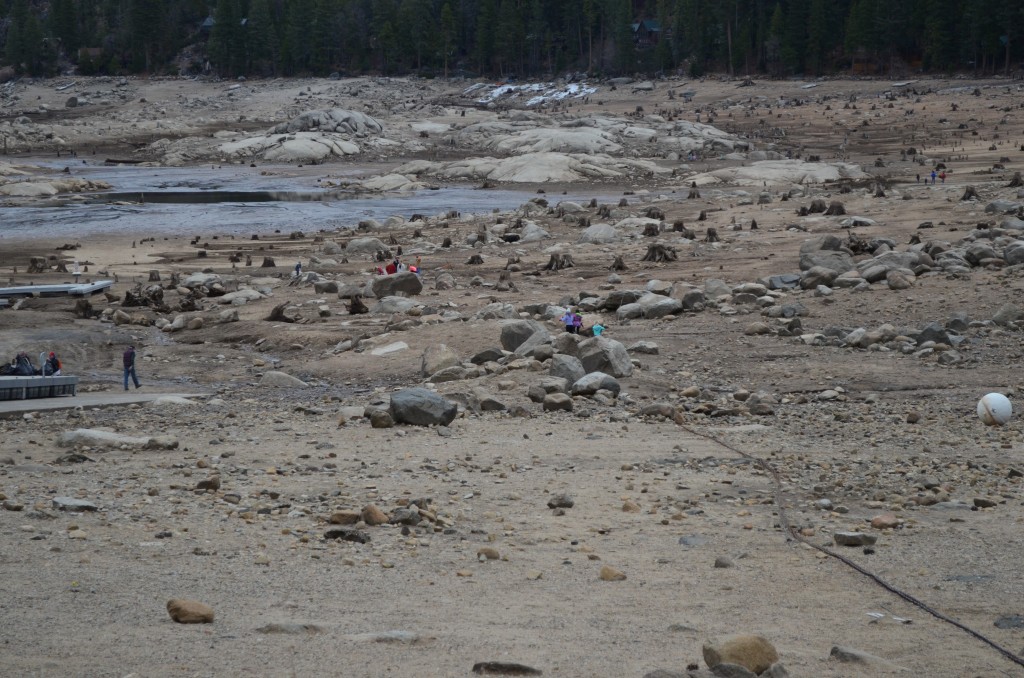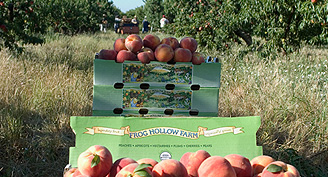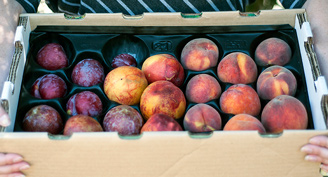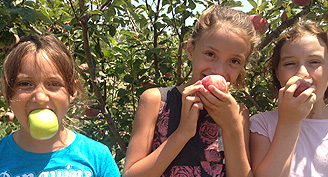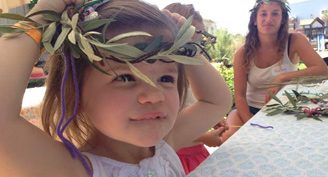THIS WEEK'S FRUIT
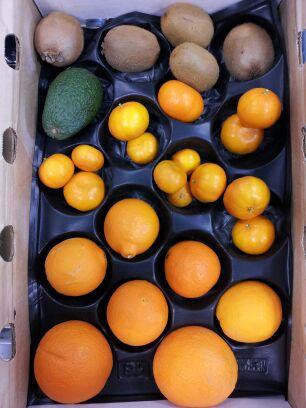 Navel Oranges
Olsen Organic Farm, Lindsay, CA
California Navel Oranges are considered to be the best Navels for eating out of hand. They have a thick skin that is easy to peel, are seedless, and have a meaty and sweet flesh that makes them a perfect snack. Navels are also great for juicing and cooking. Store out of sunlight for 2-4 days on the counter or up to two weeks in the fridge.
Tango Mandarins
Abounding Harvest, Los Gatos, CA
Tango Mandarins are sweet, juict and easy to peel like mandarins but larger than it's cousins the satsuma or clementine. Store out of sunlight for 2-4 days on the counter or up to two weeks in the fridge.
Mineola Tangelo
Sundance Natural, Oceanside, CA
Minneolas are a cross between a grapefruit and a mandarin. Their peel is a smooth orange-red. The shape slightly resembles a bell with a round body and pronounced neck. Minnoelas have a juicy sweet flavor with a hint of tartness harkening to their grapefruit parentage. Store out of sunlight for 2-4 days on the counter or up to two weeks in the fridge.
Hayward Kiwi
Chieci Farm, Live Oak, CA
Originally known as the Chinese gooseberry due to its Chinese orgins. Hawyward Wright, a New Zealand nurseryman propagated his plants by grafting and they eventually became the preferred cultivar of growers due to their sweet flavor and thin skin. The kiwis are ripe and ready to eat upon arrival. Consume first or store in the fridge.
Hass Avocado
Tomorrows Organic, Monterey,CA
Creamy in texture, nutty in flavor, with a small to medium seed. The Hass skin is easy to peel and darkens from green to purplish-black as it ripen
Navel Oranges
Olsen Organic Farm, Lindsay, CA
California Navel Oranges are considered to be the best Navels for eating out of hand. They have a thick skin that is easy to peel, are seedless, and have a meaty and sweet flesh that makes them a perfect snack. Navels are also great for juicing and cooking. Store out of sunlight for 2-4 days on the counter or up to two weeks in the fridge.
Tango Mandarins
Abounding Harvest, Los Gatos, CA
Tango Mandarins are sweet, juict and easy to peel like mandarins but larger than it's cousins the satsuma or clementine. Store out of sunlight for 2-4 days on the counter or up to two weeks in the fridge.
Mineola Tangelo
Sundance Natural, Oceanside, CA
Minneolas are a cross between a grapefruit and a mandarin. Their peel is a smooth orange-red. The shape slightly resembles a bell with a round body and pronounced neck. Minnoelas have a juicy sweet flavor with a hint of tartness harkening to their grapefruit parentage. Store out of sunlight for 2-4 days on the counter or up to two weeks in the fridge.
Hayward Kiwi
Chieci Farm, Live Oak, CA
Originally known as the Chinese gooseberry due to its Chinese orgins. Hawyward Wright, a New Zealand nurseryman propagated his plants by grafting and they eventually became the preferred cultivar of growers due to their sweet flavor and thin skin. The kiwis are ripe and ready to eat upon arrival. Consume first or store in the fridge.
Hass Avocado
Tomorrows Organic, Monterey,CA
Creamy in texture, nutty in flavor, with a small to medium seed. The Hass skin is easy to peel and darkens from green to purplish-black as it ripen
A NOTE FROM SARAH
Dear CSA Members,Drought
It’s here. It’s real. And for California farmers it’s scary. REALLY scary. Our way of life and our livelihood are being affected in a very real way. The livelihood of everyone who work for us (about 40 families in total) and everyone who enjoys the products we produce is threatened. Wednesday our irrigation district (Byron, Bethany Irrigation District) called an emergency meeting. In the 37 years Farmer Al has been farming this land BBiD has never called a meeting of their farmers and board members to discuss a threat to our water supply. I think I mentioned in the last news letter I wrote, our district is one of the oldest in our state. It dates pre 1914. Thank goodness. Because BBiD was formed prior to water rights becoming a political agenda their “right” to water has precedent over about 95% of those who claim water “rights” today. BUT... and this is a HUGE BUT... if this drought continues, BBiD won’t have water to send to its farmers and ranchers. It will be forced to ration or, worse case scenario, shut down all together. For this summer we’re ok. But come October and November if the rains don’t come, neither will the life giving water our trees need to survive. This is unprecedented. This is scary. Last week my family, along with two other families we’re friends with, took a short vacation up to the mountains. We took a day and went to Pinecrest Lake. Lake? What lake. There was no lake. There’s no water, therefore, no lake. Like many of you, I have been watching all this about the drought and talking to my 8 year old daughter about conserving water and what a “drought” means to our family, her friends AND our business. There was no way I was prepared for the stark reality of seeing a lake bottom where there should have been 30 feet of water. The impact was not lost on my daugh- ter and her two friends either. When we got back to the cabin all three girls said they probably shouldn’t take baths or showers that night. In fact, they decided, they should probably only be taking 1 to 2 baths/showers per week until we get a LOT more rain. While this is funny, it actually makes sense. This was the most immediate way the three of them could think of to help our households conserve water in a way that was tangible to them. Seeing the empty lake had as big an impact on these three little girls as any talking or reading we, as parents, had done. It became real to them. It became scary to the adults. We at Frog Hollow Farm will be bathing less, using buckets to catch water in our sinks to water our plants, and doing a lot of rain dances. Collectively we can make a difference and we’re hoping each of you, our CSA community, will be thinking about what you as individuals and families can do to conserve our precious water.

